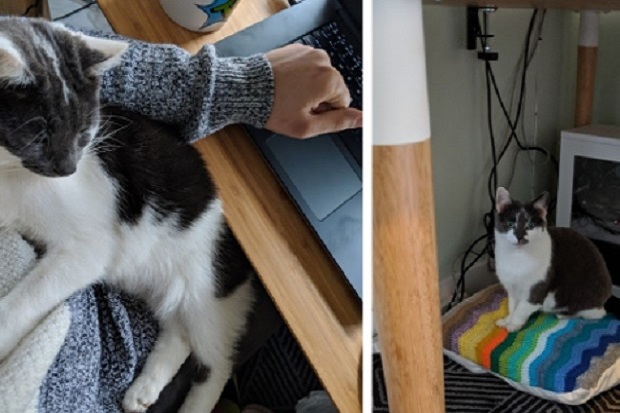As a lead software developer in Defra Digital I currently work as part of the water resources team, a mix of Defra and Environment Agency staff who occupy both technical and non-technical roles. All of us work together to push the water abstraction licencing system forward.
It’s the sort of role that happens to lend itself quite well to flexible or remote working, in most circumstances. I appreciate that we (software developers) are fortunate in the way we can do our job almost anywhere, with electricity and an internet connection - whereas our friends over in sectors like manufacturing and healthcare are typically more constrained by hours and location.
Taking nothing for granted
While I think it should be the norm for people to work flexibly, I don’t take it for granted - I consider myself extremely fortunate to have a forward-thinking employer. Defra has fully embraced flexible working practices; this meant that when Covid-19 disruptions hit the workplace, we were all primed and ready to carry on working from the safety and comfort of our homes, with no disruption to the services we run.
If anything, I’m finding that I’m able to work more effectively, and sometimes to my own detriment, for longer. I’m not spending a couple of hours a day on commuting on crowded Bristol buses, or driving around in circles looking for parking. Even when you take Covid out of the picture, I find that flexible working makes an employment opportunity far more attractive than any other staff benefit.
The long and short of it is that I can choose my hours and my own whereabouts, and that has enabled me to fit work around my life, not the other way around.
Experiencing flexible working in its many guises
Like many in my generation, I worked for far more employers and in more roles than my parents or grandparents on average would have - this meant that I got to experience working practices in a variety of places.
In some places, we could work from home on occasion as an exception, or we had semi-flexible hours (i.e. we had core hours like 10:00-16:00 or similar). Such setups create the illusion of flexible working, but under the bonnet, they are still highly restrictive.
I try to avoid generalising too much, but a glance, I would say that the Civil Service has in relative terms nailed what it means to work flexibly. I’m proud to be part of the movement towards a modern workplace.
Some of my ex-colleagues who I worked with in other industries across a myriad of sectors were rushed back into facilities and offices by their employers as soon as lockdown restrictions were relaxed, largely because there is sometimes an assumption that folks are more productive in the office setting. I don’t agree with this sentiment! If people are working together, cohesively, and towards a common goal, I don’t think it matters in the slightest what hours they work, or where.
Trust and regular contact are key
My team and I share common trust in each other’s ability to deliver - we don’t currently have core hours, and we don’t demand an office presence unless it’s absolutely necessary, or it would deliver a tangible value. We still see each other every day, albeit over video conferencing - we have our daily stand-up, and we regularly touch base with each other and have break-out sessions to discuss how everything is going.
As an Agile/Scrum team, we also have our ceremonies over video conferencing. We use various apps to stay on top of things, and to run effective sprint retros and refinement sessions. The take-away message from this is that as an organisational unit, we don’t suffer due to remote/flexible working - if anything, it enables us to perform better.
I must add that there is something magical about social brainstorming in a room together, every now and then, with post-its and whiteboards! This has been the bit I miss the most about office life. But the reality is that it doesn’t need to happen every day.

Personal impact
When evaluating whether flexible working is a good thing, I think it’s vital that we take the personal impact into account. For me, it’s just as important as the organisational performance debate, which often overshadows the personal side.
As I grow older, I am finding that careers are a marathon rather than a race - it’s vital that we look after each other and prevent burn-out. We know that folks who can choose when, how and where they work are more likely to be happy and fulfilled in their professional and personal lives, making us better equipped to look after ourselves, our loved ones, and our mental health a tad better. And as a result, hopefully, we will want to stick around and work for our employers for longer, which is great for everyone involved because it leads to better knowledge retention.
You can’t put a price on wellbeing
I believe flexible working works incredibly well for the employer and the employee. Like many others, I have caring responsibilities which I find significantly easier to manage when I can be physically close to my dependents.
If I really need to, I can drop my team a message to say I’m going to be offline for a wee bit, which allows me to go and take care of whatever it is that I need to do, like popping over to the pharmacy or throwing a wash-load on during my break. When I get back, I can pick up where I left off.
The joys don’t stop at caring responsibilities though. I’m spending less money on lunches, and I’m burning less fuel, which is a pretty good feeling. Above all, flexible working makes it possible to spend more time with my loved ones, and that’s priceless.
Find out more about National Work Life Week, the Working Families’ annual campaign to get both employers and employees talking about wellbeing at work and work-life fit.
Download the Work Life Week Toolkit for 2020.

